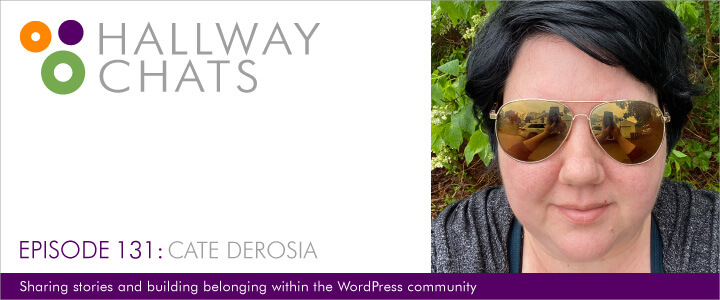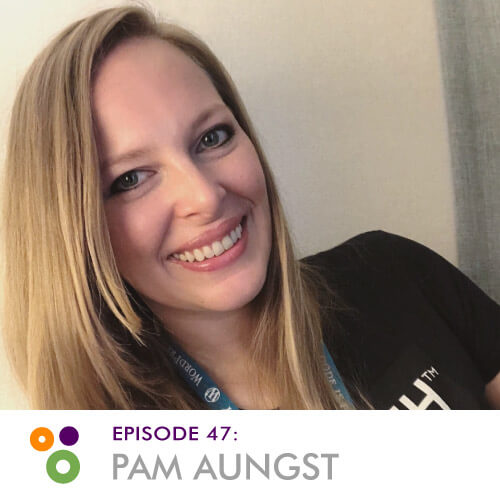Episode 131 – Cate DeRosia

Podcast: Play in new window | Download
Subscribe: RSS
Introducing Cate DeRosia
Cate has wandered around WordPress for the last five years speaking, organizing, and being an engaging human. Currently, she’s building out a family business and investigating how to expand HeroPress into a new kind of membership site.
Show Notes
Twitter | @mysweetcate
Website | HeroPress
Preferred Pronouns | She/Her
Episode Transcript
Tara: This is Hallway Chats, where we meet people who use WordPress.
Liam: We ask questions and our guests share their stories, ideas, and perspectives.
Tara: And now the conversation begins. This is Episode 131.
Liam: Welcome to Hallway Chats. I’m Liam Dempsey.
Tara: And I’m Tara Claeys. Today we’re joined by Cate DeRosia. Cate has wandered around WordPress for the last five years speaking, organizing, and being an engaging human. Currently, she’s building out a family business and investigating how to expand HeroPress into a new kind of membership site. Hi, Cate. We’re so glad you’re here.
Cate: Hi, thanks for having me.
Liam: It’s our pleasure, Cate. Thanks so much for joining us here. Can you tell us a little bit more about yourself more than what Tara shared?
Cate: Sure. I’ve been around website development since about 1996. My husband is Topher. He’s a longtime developer. I like to say that he started building websites before the internet had pictures. We’ve been married for 22 years. I homeschooled both of our girls who both graduated. The youngest graduated last year. So it’s really nice to be done with that. And I’ve been transitioning into whatever I’m going to do with my next stage of life.
Having a family that’s so deeply ingrained in WordPress, I wanted to see if that was something that I could pursue too. I’ve done a lot of ad jobs. I’ve done some work for WPSessions. I’ve done some work for Tom McFarlin. I’m really good at content related things, a lot of the soft business skills, the things that are starting to develop in WordPress as viable potential career options. And it’s kind of led me to building out a family business that encompasses the development work Topher does occasionally along with the things my younger daughter Sophie is interested in, a more of a management implementation kind of level, and then the content work that I like to do.
So it’s really helping do the extra things that websites need. It’s no longer enough to just have a website. You need to have a website where people want to be. And we’re looking at putting in the time to build out engaging websites or to add engaging aspects to websites to help improve customer loyalty and to actually better represent the business and its personality on the website.
Then of course, we also worked via HeroPress. We’ve had here press for about five years. It’s been a really interesting adventure. It’s been a little bit like the mistress in our family. But it’s also something that we are looking at turning into something that is community membership-based where people in the community can support some new content initiatives to help build better resources for other people who are entering the WordPress community, particularly in places where resources aren’t as easily accessed.
So, third world countries, just anywhere around the world. Even where I grew up just two hours north of where I am here in Grand Rapids, Michigan, the opportunities are difficult to find. And so if we can turn HeroPress into a place where not only people are inspired but can come to find actual practical help, we think it’d be a real asset to the community.
Tara: Sounds like you have a lot to share.
Liam: Can you share a little bit about HeroPress, if you would, just for folks who don’t know what it is. Maybe just a minute or two. I know we can probably go on for hours but just a minute or two.
Cate: HeroPress is a collection of essays really in its simplest form, and always will have the aspect of being a collection of essays that people have submitted about how they have used WordPress to change their life, how they found work opportunity a creative outlet. It’s everybody from kids who were homeschooled finding a place in technology to single moms. Or I know one of the ladies had quit her job to stay home with her mom. When her mom passed away, she needed to reinvent herself, and WordPress is how she did that.
We also have a lot of people, particularly from India or Indonesia where people have been able to not just build a career for themselves, but really build an opportunity for their extended family and even their communities at large. Because the opportunities for income when you can work remotely, it just improves everybody around you.
Tara: I think Liam and I have taken inspiration from HeroPress and spoke to Topher earlier on in our journey down this road of speaking to people similarly, speaking to people all over who use WordPress and for whom WordPress has made a difference in their life. But HeroPress has become so broad. I mean, how many people have contributed to it? I mean, it’s got to be hundreds, right?
Cate: I don’t have a number which I should have, but it is huge. What we’re finding is it’s not just helping the people who are submitting the stories, but automatic has it up on their internal Slack instance. And we’re hearing stories from people who are feeling kind of burnt out or feeling kind of frustrated with giving back in WordPress. You know, how challenging it can be to give back to an open source project. And then they’re seeing these stories and they’re not looking for a new job, they’re not looking to improve their life necessarily, but it’s improving their morale. And that’s just a huge outlet that we’ve never anticipated happening.
Tara: Do you and Topher work together on it as a team? What role do you play in the HeroPress other than it being the mistress?
Cate: We’ve been through a lot of startups and a lot of different opportunities, a lot of job changes. And so anything that Topher was doing that took time away from the family was challenging. Even if it’s only five hours a week. It’s difficult to have two kids you’re watching and just pull in an extra thing. But it’s something we’ve always all been committed to.
Topher and I don’t necessarily work the best together. If we want to stay married, we do a little bit better if we keep things kind of separate. But what we’ve decided is I’m going to take over…we’re actually turning HeroPress into a business. Because with a nonprofit, we have to give up a lot of control that we don’t want to give up. We need to build a board, we have to do a lot of things that we’re just not interested in. But by making it a membership site and a business, he can continue on as the chief executive officer, and he would still be the primary person who handled essays and contacting people on that side of things.
And then I would have my own lane, as it were, where I would come in as an operations person, the Chief Operating Officer, and handle more of the content creation, marketing, social media – all the things that I’m really good at that he doesn’t have the time for. He’s still involved. Maybe down the road, it would be something that he would take on in more of a full-time aspect, but right now the idea is that he’ll stay on his side and I’ll stay on my side and we’ll build something really cool together – apart.
Tara: I like that concept. My husband and I are similar. We don’t work well together on projects simultaneously. We can get in each other’s way or no not necessarily compete with each other, but fight over his way. His way is going to go, I think.
Cate: And we’re still going to collaborate. We actually had a conversation today when something came up that we’re still going to collaborate, we’ll still make decisions. The plan is we’ll still be together, but implementing it’s going to work a lot better if I have the freedom to do what I need to do and he’s is out of it a little bit. And then I don’t interfere.
This has always been my challenge. I’ve never been overly involved in HeroPress because it was mostly essay based and I’m a writer. At my core, I’m a writer who actually does quite a lot of editing. And I wanted to stay as far away from his essays as possible because it’s really hard for me to not dive in and start editing and tweaking and manipulating and wanting things to go a different direction. And that’s not really what the essays are about. They’re supposed to be personal. They’re supposed to be real.
Tara: I mean, obviously, you and I have met and spent time together and you’re well known in the WordPress community, and I think have become more so as you become more involved. But as you said, Topher has been in this space for a long time. How does that work for you guys as a couple and also as a family because your daughters now are involved in WordPress too? How much WordPress is in your house? What part of your life does that play and I guess how does that work together for your family?
Cate: It’s really fascinating. Because our kids are interested, our family is very submerged in WordPress. My first WordCamp as an attendee was my daughter’s first WordCamp. So we all went to WordCamp Chicago in 2014, and they got to go and be attendees. They were 12 and 14 at the time. We got to our spot, we split up. They went to their sessions, I went to ours. And that’s kind of how we’ve handled it.
So at home, there’s a lot of WordPress that gets taught. One of the things we’re looking at doing is a podcast ourselves kind of around our kitchen table talking about community things. And the girls are excited about being a part of that. Sophie particularly has been interested in coming on board to do a variety of things. My older daughter, Emma, has a lot of the same skills that I have. And so she’s enjoying being separate for a little while but has also expressed some interest.
However, when we’re out at events, one of the things we try really hard to do is we don’t necessarily use our last name. When we introduce ourselves to people, we do it by first name. I don’t always try to be close to Topher so that there’s some separation. And it’s not because I don’t want to spend time with him, although generally, the things he’s talking about are things I’m interested in hearing anyway. But it’s about having the opportunity to be individuals and build our own relationships. And the girls have done that too, where they have their own friends, with adults in WordPress.
So at homely talk about it a lot. It is definitely an aspect of our lives, a primary aspect. But when we go to WordCamp, we try to be autonomous as much as possible. One of my favorite moments was at PressNomics this last year that I was talking to a guy and he’s like, “Oh, have you met this guy, Topher?” I was like, “Oh, I just love you so much.” That was impossible.
Tara: Hopefully he saying something nice about him, which anybody wouldn’t say anything…
Cate: Well, he was from Chicago and we’re in Grand Rapids, so it only like three hours away. Obviously, met Topher at some point. But it was really great to be able to be…and particularly because I went right from college to having kids to being home. So I was my parents’ child to being my husband’s wife to being my kid’s mom. Having the opportunity to have some autonomy is nice.
Liam: I respect that a lot. I mean as we get older, we’re somebody’s younger sibling and then we’re somebody’s partner or spouse and then eventually you’re junior’s mom and junior’s dad, junior’s bus ride and junior’s coach. I get that. Especially with somebody like Topher who’s so active in the WordPress community, and so gregarious and so nice to be with. He’s a wonderful, wonderful guy in practically every way so that a lot of people know him and like him because he’s so noble. I totally respect him for that. Going in there and do our own thing, and, you know, inevitably they’re going to know that we’re related Topher. And that’s a good thing. And that’s a nice thing. I certainly respect you for that.
Cate: It’s been good. I have different conversations with people than he has, and so we learn different aspects of businesses or different elements of the community in different ways, which has been really helpful.
Liam: Cate, I want to ask you one of our two signature questions here, and it’s around success. And the question is, how would you define it? And maybe it’s a personal definition, maybe it’s a professional definition, maybe it’s a mixture of both. Cate, how do you define success?
Cate: That’s a funny one. I grew up on a farm, and my dad was a marine, and success meant you got it done. You got it done right and the first time and you didn’t go to bed until it was done right and hopefully the first time. The definition I have is accomplishing something, which has been a real challenge as a parent because in reality, you accomplished nothing for like the first 20 years of parenting, and you just hope you get it right.
But I’ve really learned that success isn’t about what you accomplish; it’s about showing up and trying again the next day. It’s about learning from your mistakes and growing from them. Because you can’t always accomplish things, or at least even when you do, they don’t always look the way you thought they should. But that doesn’t mean you fail. That doesn’t mean it wasn’t an accomplishment. It just means that that turned out differently than you expected.
Liam: I liked that definition a lot. I think that it’s pretty clear that you spent some time thinking about that and have referenced a number of different factors in your life and growing up and transitioning maybe from the way your parents thought about success to the way that you think about success. And not that one’s better than the other, but we each have to figure it out for ourselves.
Cate: Oh, you’re welcome on. I’ve seen them change too, which is really cool. Over time. I think that’s one of the best things is that we’re always growing into our best self, if we take that opportunity. We all start with whatever we start with, and it’s what you do with it that really matters.
Tara: We are in a strange time in the world and in the community, in the country, and I think there’s a lot of thought going into the idea of being your best self. How are you handling that? How are you facing this shutdown COVID time and combining that with your thoughts on success and your plans for HeroPress? How’s that all fitting together?
Cate: That’s actually interesting. For one thing, I guess in a lot of ways, the plans for HeroPress came out of the shutdown. I’m always intending to go another way and ending up someplace completely different. That is like the one theme in my entire life. And so I’ve been busier than ever through the shutdown. I would really like to have some time to just be bored. But as I’ve been, I’ve been really slow to choose what I do next.
When I left for college, I had one plan for what I was going to do, and got there and realized that I had a million opportunities. So I’ve been intentionally taking time to look around to learn some things and be patient which is not my strong suit. But to be patient and kind of watch things evolve and kind of let things come to me a little bit because I have the opportunity to do that. And so the direction I intended to take with my other business has shifted, but happily.
This opportunity that came to expand HeroPress, it actually comes out of a failed job interview. I applied for a job last Monday, like within a couple of hours was told that I would not be getting a second interview. But as I was applying for the job, I was looking at it and thinking, why don’t I do this for HeroPress? This is exactly what I could be doing to drive this forward.
And so I’ve been trying while things are shut down to look for the opportunities that are there, to build the relationships that I can build, to use the resources that I do have. And I look at it and think about what life is going to be like next because it’s not going to be the same. A big part of that As a lot more things are going to move online. People are going to need more online resources. They’re going to need more help getting started. And so that’s channeled a lot of what we’re looking at for HeroPress.
Tara: That’s exciting. I think that what you’re trying to do with HeroPress sounds really interesting. And because HeroPress is pretty well known, I think that you’re starting off with something that already has a great reputation in the community. So I hope that it goes smoothly, and I look forward to seeing what happens with it.
We like to ask our guests another question, which is about advice. And so I’m going to ask you if you have received any advice that you’ve taken to heart and put to action in your life. You’ve talked a little bit about your upbringing and your approach to work and getting things done. But if there’s any advice that comes to mind that you find meaningful that you’d like to share?
Cate: Yeah. Actually, I found a quote to sum it up. It’s one of those things that I’ve heard in the community a variety of times. Teddy Roosevelt said, “The comparison is the thief of joy.” One of the biggest challenges I have coming in where I am is that almost everybody I know has been doing something businessy. They’ve been good at something for 5 years, 10 years, 20 years. All of my friends are successful. And sometimes I just feel like a fish flopping around on the beach because I’m still figuring out what next looks like. I’m reluctant to rush but I’m always afraid I’m behind. And it’s exhausting.
I made a commitment when I started this that I wasn’t going to just drop my family and walk away. I mean, I spent a long time building relationships here. I’ve invested a lot in them. And they’ve had some challenges that have made it necessary for me to step back just as things start to get going. And what I’ve had to really accept is that my journey is just going to look different, that my success is going to look different, that what I build is going to look different. And that’s okay. We’re all supposed to be different. I can’t be Tara. I definitely can’t be Liam. But I can’t compare it to anybody else because I don’t compare to anybody else. And that’s okay. That’s what it’s supposed to be.
Tara: Thanks for sharing that. I think it’s really important to be open about that idea. We hear a lot about imposter syndrome which is similar to that idea. But I think it’s so easy to compare yourself to other people. I do it all the time. First of all, things always look better than they actually are. People always look more successful than they actually are. I know I can make it sound like I’m a lot more successful in air quotes than I am, and social media, of course, everybody looks happy and perfect. And we’ve seen a lot more coming out in our community about people being honest about challenges that they face, whether they’re having mental health challenges, other challenges that they face in their careers and their businesses. So it’s really important to be open and honest about that.
I mean, I’ve had many conversations with you and I think you seem very confident and I think you’re extremely talented and delightful to be with. So to hear you say that you compare yourself to others when probably a lot of people compare themselves to you it’s helpful to hear, right? To share that you’re not the only one that feels that way.
Cate: So it’s nice of you to say, but I have to say confidence is my hardest one. And it’s a practical aspect. I’m profoundly honest, which is not always the best thing. Particularly about my own struggles. Like I have a hard time going into a job interview for a job that I’ve never done and say, “Oh, yes, I will be outstanding at this,” because there’s 100% chance that I’m going to be a miserable failure at this. I mean, people fail all the time of things for a variety of reasons.
And coming from a situation where I’ve worked for the last 20 years pretty much by myself, I’ve not had job evaluations, I don’t get raises, I don’t get any positive or very little positive, constructive feedback. I do get quite a lot of constructive feedback but it’s not always positive. And that’s fine. And that makes sense. But it makes it really difficult to get started doing something else because I don’t want to lie to somebody about like, I feel like I’m good at something and I have some reasons to believe I’m good at something, but I can’t walk into a job interview and say, “Oh, yes, I’ve been good at this for five years.”
Because I may have been doing it for five years, there are so many things I’ve done over the last 20 years between being a teacher, helping Topher with contract work. I’ve been deeply involved in startups and nonprofits. Basically, I’ve been involved in much of everything that Topher’s done, but not ever with a title or a salary or with a job review. And so it makes it difficult to present that knowledge to people and get respect for it. I’ve spent a lot of my life being just Topher’s housewife. And so it’s difficult to figure out how to work with all of that.
Liam: I think we see that a lot and particularly in this economy where a lot of folks are increasingly finding themselves out of work and need a career transition. “I’m smart, I can do things. I know how to do things. I’m computer savvy.” Have I9 ever done that? No. But I figured out how to do all the stuff I’ve done so far.” And having the capacity or the wherewithal and also a little bit of the luck there to be able to convince somebody, “Now, she doesn’t know how to do it yet, but clearly, she can learn. We all did, and one of the smartest folks in the world. So somebody else can hopefully learn.” That’s tough to step into a job interview and you’re effectively saying, “Trust me on this, I got it.” There’s a lot of reasons, personal and cultural, why folks don’t want to give people the benefit of the doubt or the trust.
Cate: And on the flip side, I’ve seen that in a small business economy like WordPress tends to be, the wrong hire can be devastating It can be a huge setback to your business. And so it is a difficult thing. And no matter how much you may like somebody, no matter how much you may respect somebody, it’s a difficult thing to step forward and trust them.
Tara: What do you think as a mom, as a parent, of course, we, as parents, we multitask and we absorb a lot from our kids, as you talked about, you don’t get a bonus or a raise or a job review, but you do get a lot of feedback from your children, I’m sure. What do you think that they take away from what you’re transitioning to? I imagine that you’re modeling for them. I know your kids and the really great relationship you have. What do you think about in terms of that?
Cate: I’m really excited. When I was their age, the idea of just stepping out and starting your own business was not something you could do for a variety of reasons. I mean, if you had the right set of finances behind you, particularly being in Michigan, particularly being in northern Michigan, there’s not a lot of money, there’s not a lot of opportunities. So it was not something that ever crossed my mind. Where my girls have been through three startups, they’ve been through multiple job changes, they’re not afraid. Like at age 10 or 12, they started talking about what their business might look like when they became adults.
And now I’m really happy that they’re home, that they’re here while I’m going through the hard part of all of this so that we can do it together. They get to see what it looks like. They get to learn from what I do? I’ve helped them with jobs, resumes, with cover letters, with interviews. I’m really thankful that they’re seeing both the good and the bad of it. Because they can see the bad of it and know that that’s okay, that that’s normal, that’s what happens, that everybody’s gone through that. And we can just support one another through it. That’s always been our theme as a family.
We live in a 1300 square foot house that only has one bathroom. There’s no hiding anything. We’re all home together all the time. And so we go through everything together. And in doing that, we’re all stronger for it. Because we get feedback from their perspectives, they get feedback from our perspectives, and we just tackle it together.
Tara: Are they going to work with you in this new business?
Cate: Yeah, actually. They’re pretty excited. I didn’t do it intentionally, but both girls ended up with really strong communication skills and writing and editing, as well as technical skills. They each have their own career. Sophie and Emma are both incredible artists. They have a lot of potential in the future. And as jobs come in for me, particularly now that I’m going to be doing more work with HeroPress, as things come through my typical services business, I can funnel those off to them, still be the supervisor but helps them build a good resume and some good skills to move forward with. And plus, the company’s left a little open-ended so that as they find things that they’re interested in, they can choose to include them in the company if they want to.
Liam: What’s been your biggest challenge to date with thinking about and approaching this pretty significant transition that you’re dealing with, that you’re going through and working on and all those other types of phrases?
Cate: My biggest challenge is freelancer PTSD. It’s been an ugly 10 years.
Liam: Cate, what is that? Be specific there.
Cate: It is literally…obviously not to the same depth as a soldier coming back from war. I don’t like chaos. I love change. Topher loves chaos. He doesn’t mind chaos. He loves chasing the next shiny thing. He loves trying new options. For him, every new thing, every job change which has been about every year and a half has been something spectacular and wonderful and he’s moved on to something new and fun with new coworkers and new resources and often a slightly different kind of job. It’s never the same thing over and over again. So his is always fun.
I’m always scrambling to figure out what time zone we’re currently working in, how to shift the girl’s schedule around it, when’s dinner going to be. It’s like moving houses every time he changes jobs. And so he doesn’t do any of that because he’s working because that’s how we set up our family. So I’m doing all of it for managing…We started when the girls were 8 and 10. So through the entire teenage years, I managed all their feelings, I manage all household things, I managed everything that wasn’t Topher working. And I’ve had to put things on hold that I wanted to do. I’ve cried myself to sleep wondering how I was going to pay for such and such and such.
And so as I look to step forward into yet another startup, yet another entrepreneurial adventure, I have to have the courage to be willing to take on the truth that it’s going to be hard, it’s going to have setbacks, it’s going to be miserable sometimes, and I’m going to really hate it because consistent that’s how…if you listen to anybody’s story.
I listened to Dre Armeda talking about this. It really, really hit me – at the first Prestige Camp, I think it was, he talked about what it was like to start their business and sleeping under the desk and not seeing the family. And it was my first time actually hearing somebody else who’d gone through these sorts of things. And the flip side of it is that that’s what it’s like to start a business. I mean, it gets better as we learn and we don’t do those kinds of things over and over again, but at the same time, it’s like having a baby. As much as you may learn how to deliver better or get better drugs or whatever, the birthing process is still the birthing process. And it’s the same way with a new business, with freelancing.
So I have to battle wanting to keep doing that knowing that it’s going to be painful, knowing that there are some things that really scare me. If I hear Topher say something random that was linked to an event in the past, then it will strike fear. Like I’ll almost freeze. And so that’s what I have to overcome to want to continue or to build something new now.
Liam: That was very bravely put. Thank you for sharing that. There is much more to unpack on that than we have time for I’m afraid. Before we say goodbye, I’ll thank you again for joining us. And I’ll ask you to share with us where folks can find you online, please, Cate.
Cate: At some point, I will have a website up at atypical.services. Still in process. I tweet at @mysweetcate. And then I’ll have a presence on HeroPress. I’ll be put here very shortly as things evolve.
Tara: Cate, it’s been really great having you here. I wish we had more time. And I’m sure you and I will have more time another time. Thanks for joining us today. Really, really appreciate you being on Hallway Chats. Give our best to your family.
Cate: Thanks. Thanks for having me. It was really great to talk to both of you.
Liam: It was an absolute pleasure. Thanks for taking the time with us.
Tara: Bye.
Cate: Bye.
Tara: If you like what we’re doing here – meeting new people in our WordPress community – we invite you to tell others about it. We’re on iTunes and at hallwaychats-staging.ulpgsyz6-liquidwebsites.com.
Liam: Better yet, ask your WordPress friends and colleagues to join us on the show. Encourage them to complete the “Be on the show” form on our site, to tell us about themselves.





